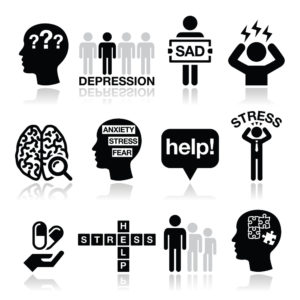Dual diagnosis or co-occurring disorder is rather common. When someone is addicted to drugs or alcohol, they can reveal an unknown mental health issue. But there’s always the chance that the substance abuse brings on mental illness as time progresses.
Sometimes it’s the result of pairing a substance addiction with a mental health condition. Other times, substance abuse brings on the mental health condition. Regardless, people seek assistance in handling these conditions, and we provide the appropriate treatment.
 The sad truth is that many treatment centers will not work with patients suffering from co-occurring disorder . They lack the psychiatrists or medical doctors on staff to handle the mental health aspect of this illness.
The sad truth is that many treatment centers will not work with patients suffering from co-occurring disorder . They lack the psychiatrists or medical doctors on staff to handle the mental health aspect of this illness.
Since patients differ from one another and this illness presents more to handle through therapy, each patient must receive one-on-one treatment as opposed to a single approach. Cookie cutter methods don’t work in these cases, and addressing both the mental illness and the addiction is essential to treat patients successfully.
In this article, we’ll discuss dual diagnosis examples and what you can expect from each of them. After reading this article, you’ll have a better understanding of why dual diagnosis treatment is necessary.
If you or a loved one need treatment for co-occurring disorders, contact our Florida rehab center by calling 1-800-626-1980.
Your call could save a life.
Examples Of Dual Diagnosis Disorders
Understanding multiple diagnosis examples and how they impact patients provides insight when seeking treatment.
The truth of the matter is some addicts are using substances for self-medicating mental health symptoms. With this being said, other addicts develop symptoms of a mental health issue following substance abuse. The following are the mental health problems commonly associated with co-occurring disorder:
Bipolar Disorder
This mental health problem is usually accompanied by cocaine or alcohol abuse. Ultimately, the substance of choice often depends on whether the individual is in a manic or depressive cycle. Some symptoms that can be expected include intense shifts in mood, functioning, and energy associated with whether the individual is suffering from mania or depression.
PTSD – Post-Traumatic Stress Disorder
When it comes to PTSD, addicts generally seek to dull their responses to the illness. They usually use alcohol, benzodiazepines, and sleeping pills as they seek out relief from symptoms accompanying this mental illness. Opioid abuse is also somewhat common in those coping with PTSD.
The symptoms come with unbearable intensity, driving people to turn to self-medicating. Those who have PTSD will experience nightmares, detachment, hypervigilance, and recurring stress following a traumatic event. This mental illness is associated with extreme trauma such as war, assault, or rape, but other events can cause a post-traumatic stress response in a person’s brain. Ultimately, what these problems stem from can be a matter of perspective.
ADHD
People coping with ADHD tend to turn to alcohol and/or stimulants. This is because, with these substances, it’s possible for the individual to heighten their sense of relaxation or focus. In turn, this helps by alleviating the symptoms of ADHD.
Someone with ADHD will find it persistently challenging to remain focused. They have hyperactivity-impulsivity, and their inattention is rather constant. “Zoning out” is also common, as is struggling to finish tasks, addictive tendencies, and chronic lateness. These individuals are also easily distracted.
Depression
Alcohol abuse is common amongst people attempting to cope with this mental illness. This substance works to slow down and depress a person’s sensations. As a result, the liquor masks the symptoms of depression.
Depression comes with feelings of sadness and an empty mood. Some people will feel worthless or hopeless as well. These individuals can feel fatigued, a loss of interest in activities they once found enjoyable, and a lack of energy or motivation too.
Anxiety Disorder
People with an anxiety disorder will usually turn to benzodiazepines, alcohol, and sometimes, cocaine. Other prescription drugs, including Xanax, Klonopin, Valium, and Ativan can be used to treat anxiety disorder, but these medications are extremely addictive. These substances allow the individual to handle their anxiety, resulting in the continued use of these substances in an attempt to dodge the symptoms.
When someone has anxiety, they are excessively worried. They might also feel apprehensive, expecting the worst things to occur. Ultimately, anxiety can be debilitating, adversely impacting the person’s daily functioning.
Panic Disorder
Social situations can have a terrible impact on someone with a panic disorder. With this in mind, the individual might use psychiatric medications such as benzodiazepines to handle their symptoms. Alcohol is another substance these individuals tend to use for these situations.
The symptoms of a panic disorder are rather intense. It’s common for these individuals to have recurring panic attacks characterized by trembling, chest pain, nausea, feeling of choking, sweating, fear of dying, and feelings of dizziness.
Schizophrenia
When someone has schizophrenia, stimulants are usually the go-to substance. Whether it’s nicotine, caffeine, or one of the other 10 most commonly abused substances, these stimulants temporarily help with the disruptive symptoms of this mental illness.
Someone who has schizophrenia can have a difficult time coping with the symptoms. Hallucinations, delusions, and disorganized behavior and speech characterize this issue.
OCD – Obsessive-Compulsive Disorder
Someone with OCD might use cannabis or alcohol. These substances assist in mellowing the person out, calming down the obsessive thoughts characterizing this mental illness.
OCD is a time-consuming problem. When someone goes through recurrent compulsions or obsessions, these thoughts can dominate their life. With this being the case, treatment can assist in diminishing the adverse impacts OCD has on daily function.
Dual Diagnosis Recovery
While you might find yourself amidst a whirlwind of substance abuse and mental illness, you’re not alone. By reaching out and finding the right treatment, it’s possible to learn how to handle these problems in a way that allows you to live the happy, healthy, clean lifestyle you deserve.
Seeking treatment for a dual diagnosis rehab center in Florida? Find a better transition of yourself at our excellent facilities with help from our expert staff members. If you or someone you love are seeking treatment, please contact us today by calling 1-800-626-1980.

















